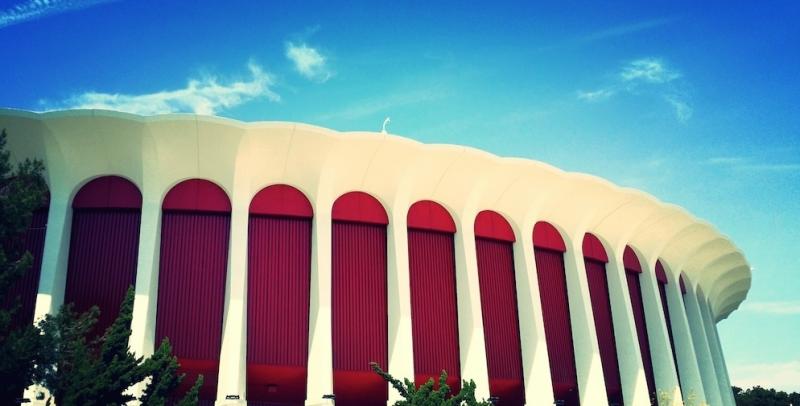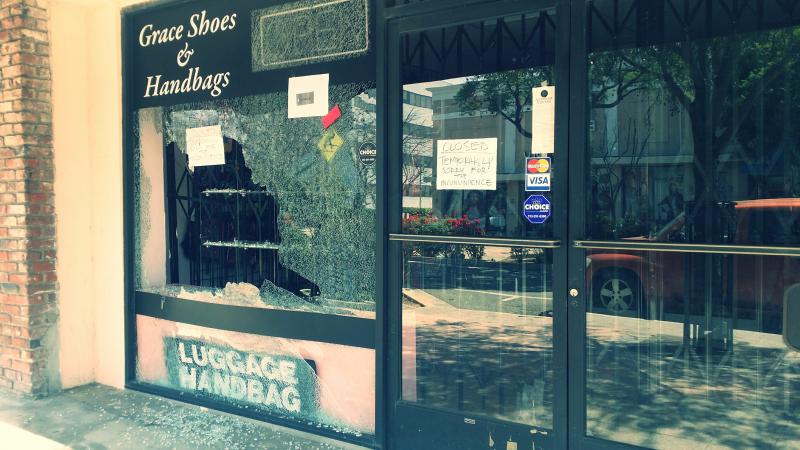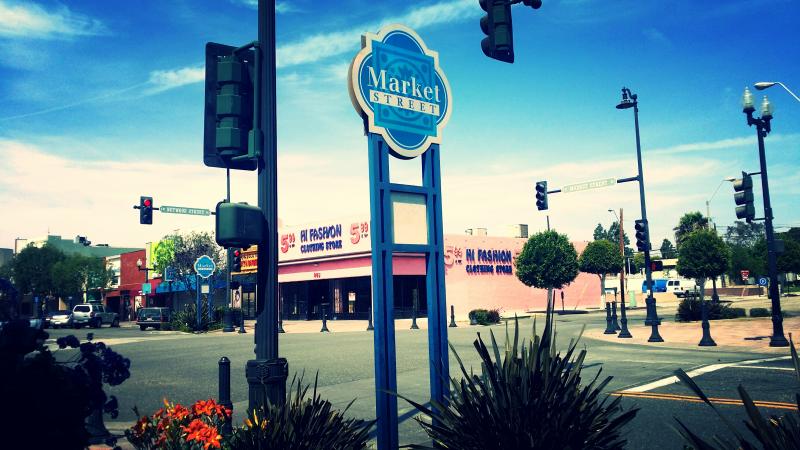Inglewood Could Be Making A Comeback

“If I say to you, ‘let’s go to Inglewood,’ you probably don’t picture a city, do you?”
As an artist and partner at (fer) Studio, an architecture firm in Inglewood, Mercier is an outspoken advocate for revitalizing Inglewood—starting with a city-wide rebranding.
“You probably imagined four things,” said Mercier. “The Forum, Hollywood Park, rap music and crime.”
For many people, this assumption holds true. Inglewood is a place better known for its past—as the former home of the Los Angeles Lakers for 32 seasons, site of the iconic Randy’s Donuts, and a ubiquitous name-check in ‘90s West Coast rap—than its current endeavors or future plans.
“The city has created income from these things,” said Mercier. “It’s created a brand that isn’t good branding.”
But then perhaps this is an inescapable reality, as Inglewood’s history courses through nearly everything it is and plans to be. The “Fabulous” Forum, once a professional sports arena, reopened in January as a repurposed entertainment venue, and is set to host Justin Timberlake, Arcade Fire and the MTV Video Music Awards in the next few months. And the Hollywood Park Racetrack, opened in 1938, was closed in December after 75 years to make way for the 238-acre Hollywood Park Tomorrow project.
Though both projects aim to draw outsiders, and revenue, to the city, their supporters say these spaces play a more critical role to Ingelwood's community than ever before.
“The historic Forum is known world-wide as having been the site of some of the best concert, sports and entertainment events,” said Sid Greenfeig, senior vice president of West Coast business operations for The Madison Square Garden Company, which owns The Forum. “That history continues today, with the venue’s reinvention. We have been extremely successful in delivering a truly unrivaled experience for both artists and fans as well as doing good for Inglewood and surrounding communities.”
With these multi-million dollar development projects, two Inglewood stops planned along the new $2 billion Crenshaw/LAX Metro line and high-profile real estate transactions that routinely set off rumors of a professional sports team returning to the area, a sort of Inglewood renaissance seems to be in the works.
But things weren’t always this way. (Fer) Studio first migrated to Inglewood from Culver City in 2003 because of the area’s relatively low real estate prices, and at the time, there wasn’t much of a conversation about revitalizing Inglewood, said Mercier.
“Inglewood is one of the last cities close to the ocean that’s underdeveloped and underutilized. It’s Culver City twenty years ago, before Culver City started developing,” said Mercier, who says he has been battling against the city’s hesitation to tap into its potential. “When the new light rail was announced, no one was talking about it. How does a city have a light rail stop coming and not even address it?”
The proposed Crenshaw/LAX Metro line will run through the closest thing Inglewood has to a main street—Market Street—a multi-block stretch of restaurants and retail establishments, scattered with the occasional salon, auto repair shop and even a Church of Scientology, constructed in 2011.
Revitalizing Market Street was the focus of (fer) Studio’s Master Plan, but its current state seems to indicate that larger redevelopment projects have placed its renewal on the back burner.

The root of Market Street's woes, some residents say, is the city of Inglewood itself.
“The city doesn’t seem very business-friendly,” said Carrey Neal, an employee at Stuff I Eat, a vegan and vegetarian restaurant located on Market Street. Though the family-owned restaurant is welcoming and well-populated, even on a quiet Sunday afternoon, it's surrounded by blocks of boarded-up storefronts.
“This is prime retail property, but it’s vacant, and a lot of it has to do with the city,” said Neal. “It’s been like this for a while. We’ve been here six years and we’re basically the pillar of the block.”
According to Neal, Stuff I Eat has found success on Market Street because its healthy options serve a niche market, and in February the restaurant was even named one of Yelp’s Top 100 Places to Eat in the US.
But other establishments haven’t fared quite as well. Neal has seen numerous Market Street restaurants and retailers close their doors in the relatively short time Stuff I Eat has been open.
“We’ve been waiting on everybody for six years,” said Neal. “The area is growing and The Forum is bringing in traffic, but it’s been slow. We’re able to draw from a wide range of people and bring people into the community, but outside of us there’s nothing really to offer here. Hopefully that changes in the future.”
For Culver City resident and Stuff I Eat regular Rajay Kumar, the preconceived notions that people may still hold about Inglewood stand as very real obstacles to its success.
“I grew up thinking Inglewood was an unsafe area,” said Kumar, who first sought out Stuff I Eat in search of a decent vegan bread pudding. “So I was surprised when I actually came here and saw how nice and clean it was. It’s really a hidden gem of LA.”
One of the few retail stores still open along Market Street, Fashion Express, has seen the typical ups and downs of most businesses in recent years. But has still managed to stay afloat, unlike many other establishments on the street, said Sandi Hyon, whose family has owned the store since the mid '90s.
When it comes to the idea that The Forum and other future Inglewood development will benefit Market Street by association, however, Hyon is somewhat skeptical.
"I know that The Forum helps Inglewood, but I don’t know if that affects Market Street,” said Hyon. “I think people are just going to go to The Forum and watch concerts and then leave, and I wish it wasn’t that way. It would be nice if something could be done to lift up the surrounding area.”
This attitude of skepticism is fairly common and understandable among Inglewood residents, according to (fer) Studio’s Mercier.
“A lot of things were promised to citizens that never actually came to fruition,” said Mercier. “When were were developing the Master Plan ideas, a lot of people were doubtful that it would ever be implemented or could become a reality.”
So (fer) Studio created the environmentally-minded Inglewood Master Plan, and submitted it for consideration in the Living City Design Competition—a challenge created by the Cascadia Green Building Council—in 2011. Though the plan was never developed, Mercier said it did help to ignite a conversation about revitalization.
“It's inevitable that there's going to be redevelopment and it makes sense,” said Michael Massenburg, a local artist and president of the non-profit arts organization Inglewood Cultural Arts, who has lived in Inglewood for 20 years. “With the new Metro rail it's going to grow naturally. It's a great location and there's still room for development. And they're not making any more land.”
But Inglewood's urban renewal efforts almost stalled in 2012 when all of California’s Redevelopment Agencies, more than 400 statewide, were officially dissolved by the Legislature and replaced with Successor Agencies at the local level.
“Nobody was anticipating it, and it created a lot of problems,” said Margarita Cruz, Redevelopment Manager for the City of Inglewood Successor Agency. The role of the Successor Agency, according Cruz, is to “unwind” development projects and complete contracts which existed prior to June 2011, including both The Forum and the Hollywood Park Tomorrow project.

Both developments are required to provide compensation to the city: $600,000 a year in revenue from The Forum, and $100 million in tax increments toward the Successor Agency from the Hollywood Park Tomorrow project, plus an additional $40 million in tax increments for affordable housing initiatives. The Forum was also held to a strict local hiring requirement, and is required to allow the city access to its property for things like community yard sales for a set number of days each year, said Cruz.
The Hollywood Park Tomorrow project is also expected to generate thousands of local jobs between its construction and operation, create 25 acres of public park space, 600,000 square feet of retail space and provide housing for a region with an ever-growing population.
“Inglewood is within a thirty minute drive of thirty million jobs,” said Hollywood Park Land Company project manager Gerard McCallum, who helps to oversee the Hollywood Park Tomorrow project. “As L.A. County becomes more dense, the surrounding areas are going to become more interesting and viable. Inglewood has a lot of amenities that will afford peoples’ lifestyles. And it gets a bad rap for something that doesn’t exist.”
For many, this is a critical aspect of redevelopment projects, which some proponents see as having less to do with revenue, and more to do with revamping Inglewood’s image.
“The city had a lot of community pride when the Lakers were here, and community pride really lifts a city up,” said Cruz. “Human perception plays a real critical role in economic development. It’s not just how much money you throw at a project.”
These days, according to Cruz, Inglewood works around the dissolution of its Redevelopment Agency by relying mostly on bonds and grants to fund redevelopment projects.
And the freshly renovated Forum stands as a living embodiment of the kind of redevelopment Inglewood is capable of, and to-be-completed projects such as Hollywood Park Tomorrow and the Crenshaw/LAX Metro line are signifiers—albeit distant ones—of continued renewal and growth. Though redevelopment can be a lengthy and expensive process, the key to its success, at least according to Mercier, is for those involved to remain optimistic and open-minded.
“We’ve gotten some slack from officials who say, oh that’s never going to happen in Inglewood, you can’t do that in Inglewood,” said Mercier. “But we always try to say, hey, it’s not that you can’t do that Inglewood, it’s that you haven’t done that in Inglewood.”
Reach Staff Reporter Olivia Niland here. Follow Olivia Niland on Twitter @olivianiland.



